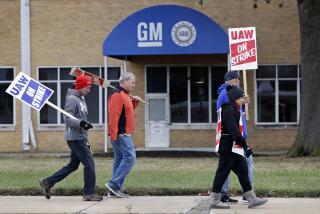DaimlerChrysler Seeks UAW Meeting on Pay
- Share via
FRANKFURT — Questions mounted at auto maker Chrysler on Thursday as its German parent, DaimlerChrysler, said it is seeking to amend a pay deal with U.S. workers at its troubled Auburn Hills, Mich.-based unit and could not rule out job cuts to help stem losses.
A DaimlerChrysler spokesman said the company will hold talks with the United Auto Workers union, which represents 76,000 hourly workers at Chrysler’s U.S. plants.
“In the talks with the UAW we will be striving for greater flexibility within the framework of the current agreements,” the spokesman said. He declined to comment on when the negotiations would begin.
There was no immediate comment from the UAW, whose wage concessions two decades ago were pivotal to Chrysler dodging bankruptcy. At the time, the union ended up making concessions to all three U.S.-based auto makers as Detroit’s losses climbed to the billions of dollars.
The current auto economy bears little resemblance to then, although DaimlerChrysler, General Motors Corp. and Ford Motor Co. have all announced temporary U.S. plant closings. DaimlerChrysler said Wednesday that it will idle three North American vehicle assembly plants next week to cut inventories.
DaimlerChrysler Chief Financial Officer Manfred Gentz told Reuters in Berlin that job cuts at Chrysler “could become an issue” and a statement may be issued in the next few days.
Gentz said the group plans further temporary plant shutdowns in North America on top of those already announced in order to keep output from outpacing demand.
Europe-based analysts said the group may have to shed as many as 20,000 employees and permanently close at least one of its 13 plants in North America as part of a comprehensive cost-cutting program.
But the UAW is likely to give a “cool reception” to any move to reopen its year-old labor contract, especially if it means job or pay cuts, a labor professor said Thursday.
“The union and Chrysler workers showed in the ‘80s they were willing to make pretty extraordinary sacrifices to save the company,” said Harley Shaiken of UC Berkeley, noting that Chrysler avoided bankruptcy with the help of worker pay cuts and federal loans.
“Things have changed. The perception is Daimler drove Chrysler into a ditch and now wants the workers to pay for towing it out,” Shaiken said.
He said DaimlerChrysler’s talk of job cuts on the U.S. Thanksgiving holiday showed that the German executives are out of touch with American workers: “Job cuts and cranberry sauce don’t go together. This is not the kind of announcement appropriate to the holiday.”
U.S. new vehicle sales are forecast to fall about 4.9% this month. Ford’s sales will decline 11%, General Motors will slide 6.9% and Chrysler will fall 7.6%, according to an estimate by Luckey Consulting Group.
Price breaks, U.S. unemployment at a 30-year low and strong consumer confidence means it’s too early to tell if the decline in auto sales will amount to more than an easing from record levels, analysts said.
“I’m not ready to call it an official slowdown in the sense that it’s sustainable,” said Mike Luckey, president of the auto industry consulting company.
But Chrysler has its own set of problems apart from the broader industry, notably growing competition in the markets it has dominated until recently: minivans and sport-utility vehicles.
Chrysler Chief Executive Dieter Zetsche, who replaced James Holden last Friday as part of sweeping management changes aimed at reviving the unit’s fortunes, began taking stock earlier this week, a process that could lead to a broad range of measures.
Zetsche sent an e-mail to Chrysler’s 128,000 employees worldwide earlier this week warning that some of the measures the group would have to take would be “painful.”
Chrysler lost $489 million in the third quarter. Analysts expect further losses in the fourth quarter and the group has said it is unclear when Chrysler will return to profitability.
DaimlerChrysler shares closed up 23 cents at $39.08 in New York Stock Exchange trading Wednesday. The stock is down 33% from its 52-week high of $58.50 in June.
Underlying economic indicators must decline further for auto sales to fundamentally slow, analyst Luckey said. Consumer confidence in the U.S. economy declined in October to its lowest level in a year, a measure that was still high enough to signal no end to the record economic expansion, now in its 10th year. And incomes rose 1.1% in September, the biggest rise in 11 months.
“It’s a softer market; it’s an incentive-driven market right now. What we’re seeing is some definite moderation as we’re heading into the holidays,” said DaimlerChrysler spokesman Jay Cooney. “I don’t think there’ll be a bursting of the bubble, [though] there’s definitely going to be significant moderation as we move forward.”






